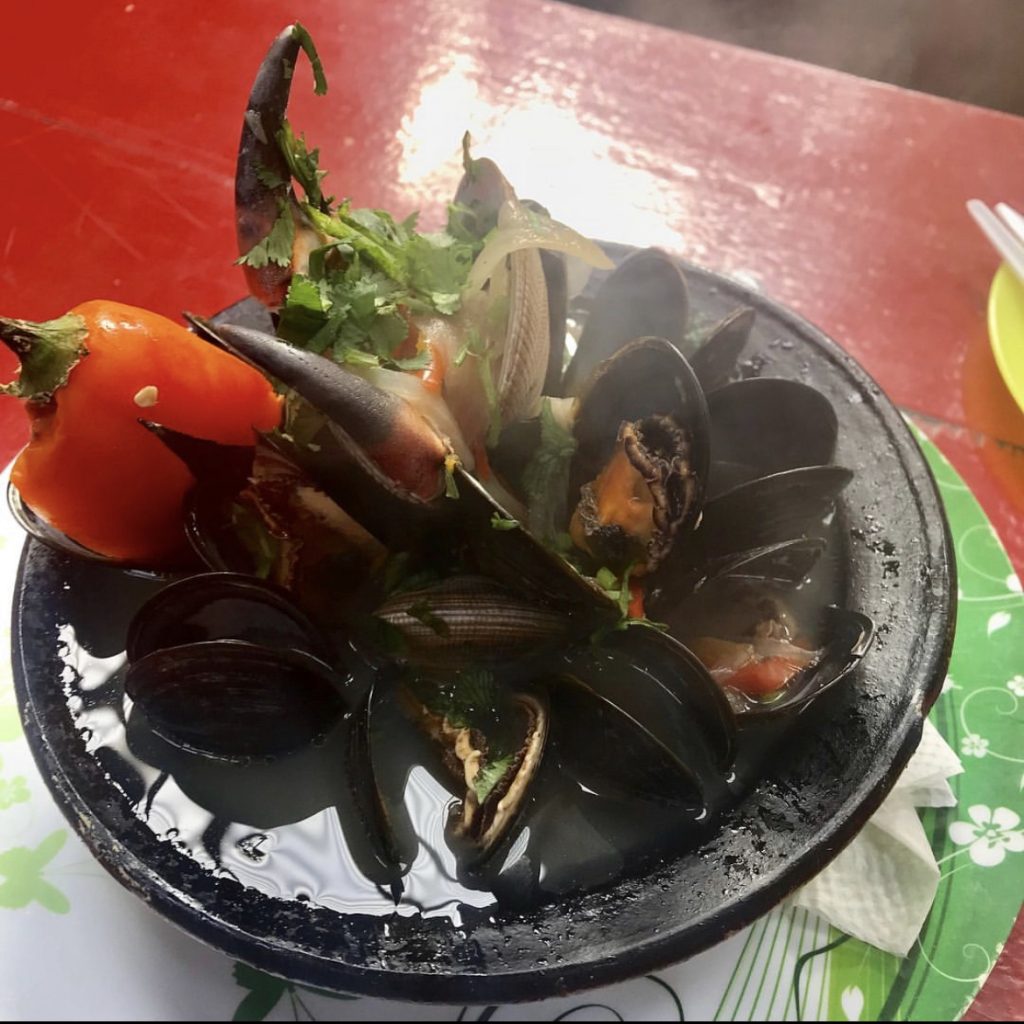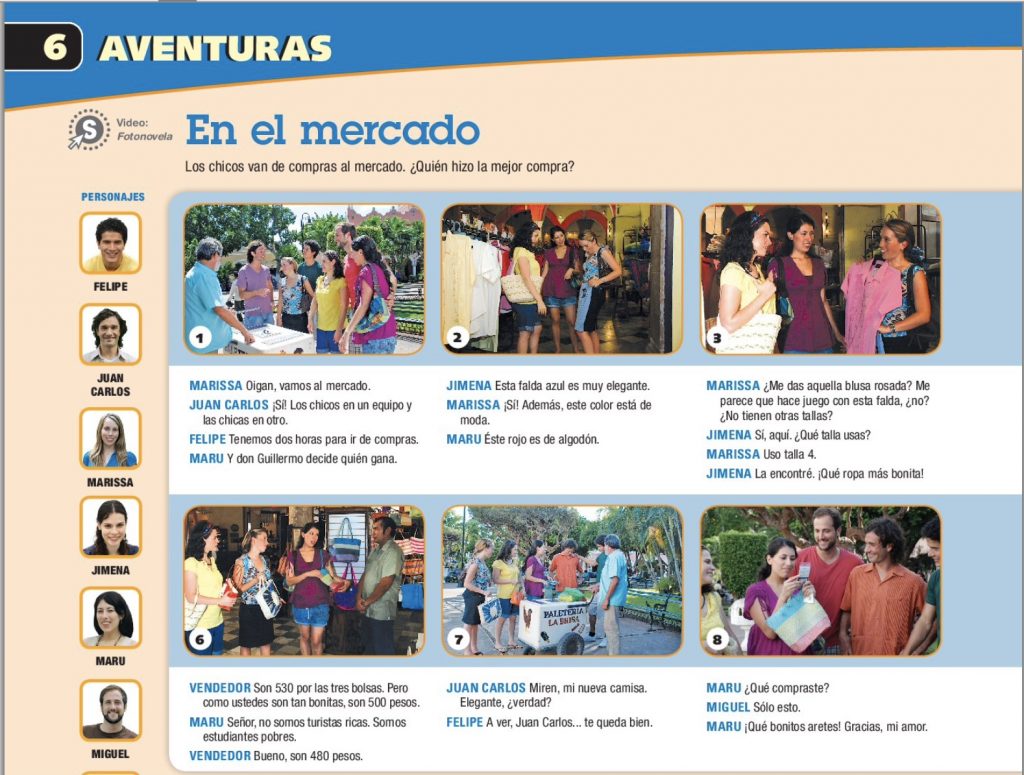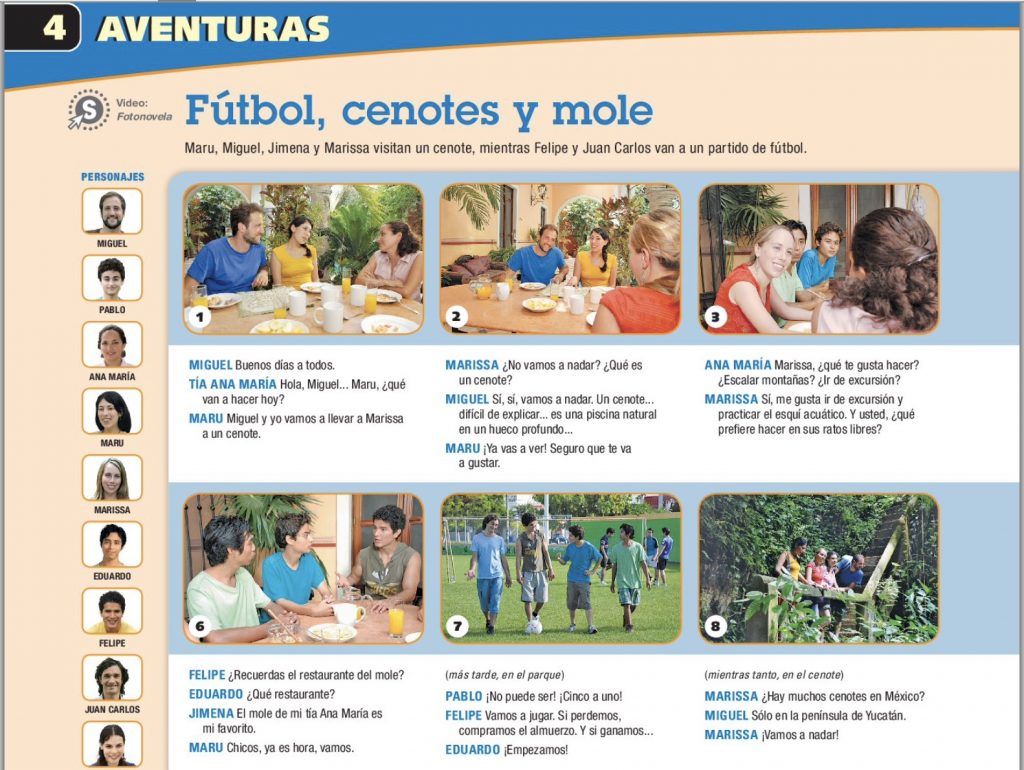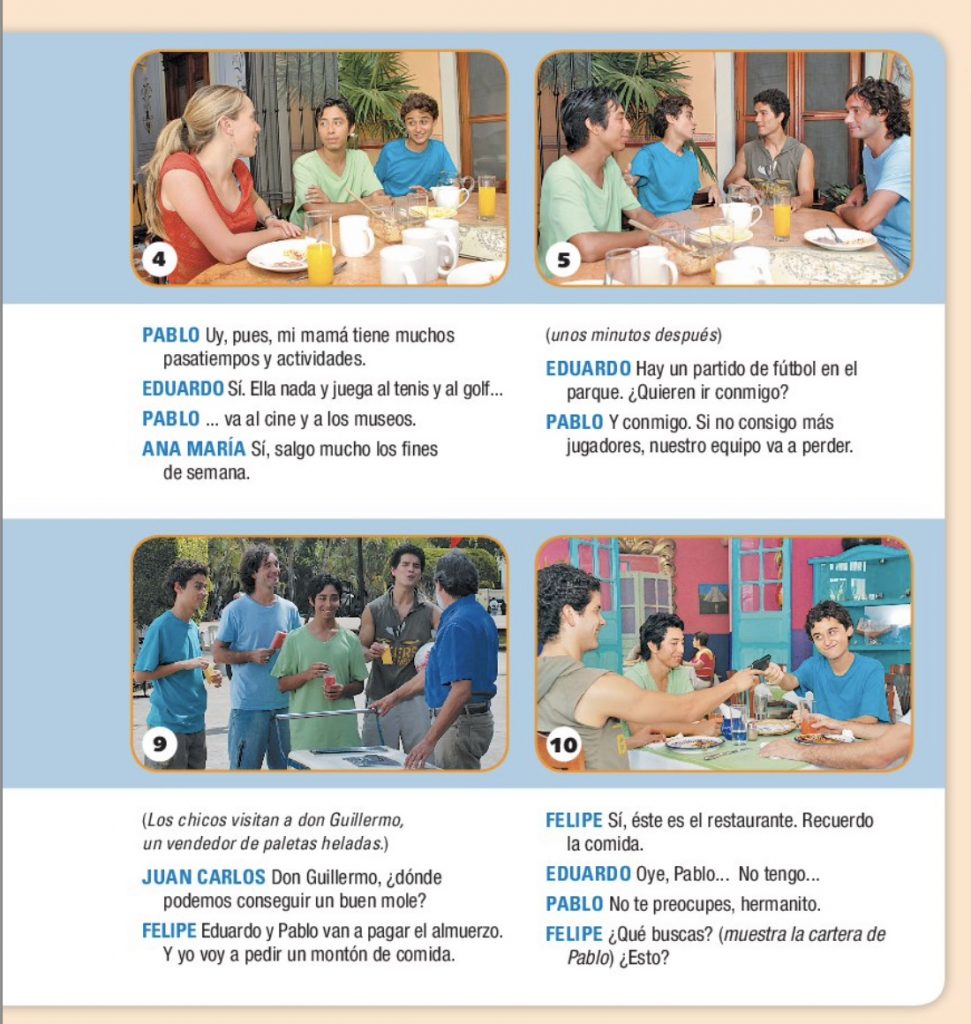Interpretive, Interpersonal, and Presentational Modes of Communication
Exploring Culture
Above all, what has given me the greatest understanding of cultural perspective is travel and the people I have met throughout my life. While books and videos are an easily accessible way to try and understand different cultures, I have found that experiencing those cultures first-hand is far more effective and enlightening. The education I have received from this Spanish class and my travel experiences really have given me a great sense of cultural perspective.
Growing up in a small town sheltered me early on in life from cultural experiences, but luckily being a part of the military has allowed me to travel to places I never thought of seeing. The Hispanic countries I have traveled to are Mexico, Chile, and Argentina. While all are Spanish speaking countries, Mexico for example is vastly different from Chile and Argentina. Prior to my travels, I had the misconception that all Spanish speakers sounded the same and shared the same cultures. This could not be further from the truth. Hearing Spanish speakers in Mexico vs Chile made me believe that they were speaking two different languages when in reality was just completely different accents and dialects. The cultures varied just as much with each country having completely different values than the other. I am very thankful these experiences and education have broken the barriers and misconceptions I had when I was younger.
The greatest realization that I have experienced from taking Spanish is that if we can break the language barrier between different languages by taking the time to learn each other’s language. In doing so, we understand that in reality we are all more similar than we think which allows us to become closer as a whole.
Engaging in Communities
During a time like the pandemic that has forced people apart and put-up walls, community at the local and global level is more important than ever. This topic is related to the friends I have made through my travels and career in the military as a healthcare worker. These friends are at home as well as scattered across the globe making up my local and global community. My local friends will set up different kinds of get togethers in my community to bring everyone closer together and to allow people like myself to experience their cultural foods, customs, and traditions.
Working in a foreign hospital with healthcare workers from different parts of the world has given me a global sense of community. Even though we are from different parts places our goal of providing quality healthcare to patients has always been the same for all of us.
Interpersonal Communication
The different types of assignments have allowed me to refine my Spanish skills more and more. The audio activities helped with my listening skills especially when I did not have a script to follow along with. TalkAbroad has been the most challenging yet most rewarding part of Spanish 102.
VHL has multiple video recordings in Spanish where you watch the video and at the end you need to recall content to answer the questions. One of the most effective videos was “En el mercado (picture below).” That lesson is realistic and easily translates to negotiating prices for whatever every you need when traveling. The discussion boards were helpful in seeing different viewpoints for different assignment topics. My favorite discussion board was reading interpreted meanings of songs by Juan Luis Guerra. It showed how music can mean certain things to some people and something completely different to others.
TalkAbroad is the pinnacle of this class. It brings together everything we have learned and applies with a native Spanish speaker. This was difficult for me because it introduced me to words I had yet to learn and a dialect that was hard for me to understand. It was so different from the other assignments because when someone is speaking to you, you must be able to understand it right then. In other assignments I can play the audio over and over again until I understand it. However, it is very rewarding during the times where you can understand what the speaker is saying and respond appropriately. What I would do differently is practice more and speak as much Spanish outside of class as I could. I have come to realize the best thing with Spanish (as with anything) is repetition, repetition, repetition.
Presentational Speaking
Below is a presentation I recorded when I was first learning Spanish. I asked five questions and answered the five questions. I use this to look back at how far I have come and use it to improve my Spanish speaking currently.
The purpose of the recording is a conversation between two roommates. One person asks what the other is doing, what they are watching, and if they would like to do something else. The other person responds by saying what they are doing, what they are watching, and how they would like to continue watching TV because they do not want to go to the restaurant to eat. It is a very elementary assignment but one that still challenged me in my early days of learning Spanish. I struggled with correct conjugation of verbs early on and remembering which verbs to conjugate and which verbs to not. I started to excel in verb conjugation by reviewing different verbs as well as speaking Spanish with some of my friends who are native speakers. Next time I will get a partner to make the assignment more realistic.
Presentational Writing
While most of the activities in my Spanish class have been recordings, I have completed a written activity. It consists of my preferred activities outside of campus for when I and my family have free time.
In the assignment, I describe what I like to do outside of campus such as run the Elizabeth River Trail, listen to rock and hip-hop music, and eat with my parents at a local Greek restaurant. I also like to play basketball, go to the beach, and go shopping in the evenings. This assignment helped me grow as a writer. I had mainly practiced speaking Spanish and not writing it. This assignment really challenged my spelling of certain words and accents. The most difficult part was writing the composition in a way that it flows as you are reading it. After revising the composition countless times, it became easier chose the proper words and help it flow naturally. Next time, I will practice by spending more time writing in Spanish to improve my skills.
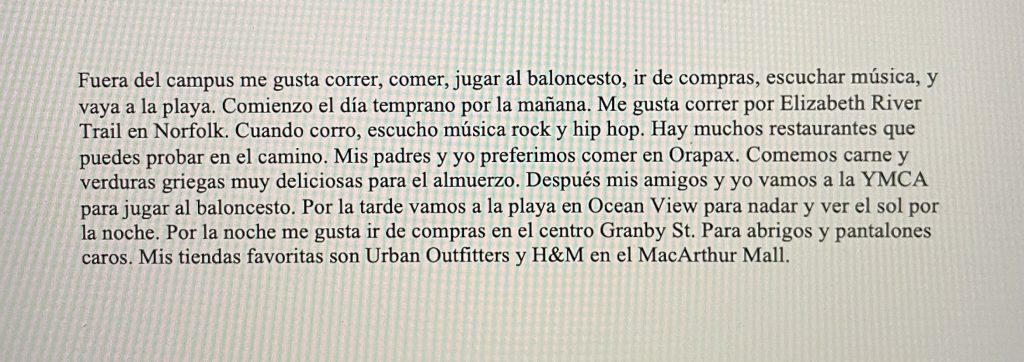
Interpretive Listening
My favorite assignment for interpretive listening was a discussion board posts about songs from Juan Luis Guerra. The assignment was to choose a song by him and interpret what the song meant to us.
The song I chose was Palomita Blanca which translates to Little White Dove. Reflecting on the challenges of this assignment, the first was choosing a song that I could understand. He has so many songs, but I felt like some were above my current Spanish level therefore it was difficult to translate. When I discovered Palomita Blanca, I was able to understand most of it to be able to interpret it. To better understand Spanish songs in the future, I play Spanish music instead of English music in my spare time. I find myself understanding more and more of the songs each time I listen to them. Below you will find the link to the video Palomita Blanca.
Citation: Juan Luis Guerra Palomita Blanca. YouTube. (2008, February 25). Retrieved December 1, 2021, from https://youtu.be/yzWihBERpio.
Interpretive Reading
Interpretive reading comprised of at least a third of my Spanish class and for good reason. I consider reading the textbook as interpreting how to speak Spanish and how to use such as verbs and articles in the correct way with the correct conjugation. For communication interpretive reading, the most helpful assignments were the Aventuras social interactive assignments in the textbook.
Below you will see an example of one of these assignments called “Fútbol, cenotes y mole.” The most challenging part of the assignment was translating some of the longer sentences. I had to refer to my notes to translate certain phrases the people were saying. The challenging part was also the most rewarding and allowed me to become a better Spanish interpreter. Being able to interpret real life phrases is a very rewarding feeling because it gets me one step closer to be able to use Spanish more confidently in real life!
